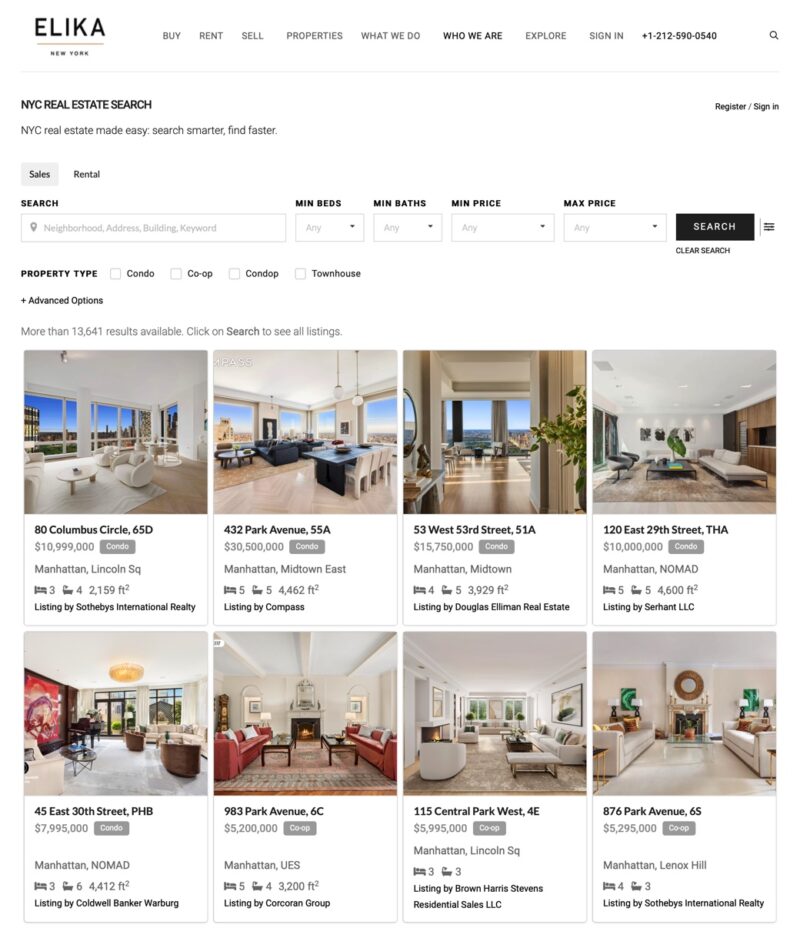Table of Contents Show
Transparency has become an ideological battleground in the shifting landscape of New York City real estate. On one side stand those advocating for open access to crucial market data—days on the market, price adjustments, and a property’s entire transaction history. Conversely, a growing push toward private listing networks threatens to obscure such information, consolidating power within a select few brokerage firms.
Compass, the well-funded brokerage that once branded itself as a technology-driven disruptor, is now at the center of this debate. By pushing for private exclusives, the firm appears to be embracing a model that limits consumer access to critical data, all while securing a dominant role on both sides of a transaction.
The Case for TransparencyThe Case for Transparency
The approach is the opposite of Compass’s opaque strategy at ELIKA Real Estate, a firm dedicated to representing buyers. By providing full access to listing histories, price trends, and all associated costs, the firm aims to empower buyers with all the necessary data to make informed decisions. “It is never ethical to withhold information from homebuyers,” says ELIKA Real Estate’s founder, Gea Elika. “We believe buyers deserve to understand the full picture—not just the details a brokerage chooses to share.”
Elika’s platform delivers full transparency within its listing platform with exact days on the market and detailed cost breakdowns, giving buyers a clear understanding of a home’s value. In contrast, Compass pushes for private networks, a move many industry observers see as a strategy to control listings and manipulate agent recruitment, wrote Jonathan Miller, CEO of Miller Samuel and shared on Housing Notes.
Why Compass’s Private Network MattersWhy Compass’s Private Network Matters
At the heart of Compass’s new strategy is its bid to create a controlled environment where select properties are only accessible to its agents and clients. This system circumvents the traditional Multiple Listing Service (MLS) and (RLS), the industry-standard database where listings are shared publicly, ensuring maximum exposure.
A recent Zillow/Harris poll suggests that most sellers desire the broadest possible exposure when listing their homes. Yet, many homeowners are unaware of how private networks function or that their property could be quietly marketed to a limited buyer pool rather than the open market. According to the same survey, fewer than 20% of consumers even understood a private listing network.
Elika Buyers Representation: A Transparent AlternativeElika Buyers Representation: A Transparent Alternative
If the Real Estate Board of New York (REBNY) allows Compass’s private network practice to take hold, navigating the market as a buyer could become increasingly difficult. However, ELIKA Real Estate provides what buyers need to succeed in such an environment. By thoroughly researching every property, uncovering all relevant details, and ensuring nothing is hidden, ELIKA puts buyers in control of their decisions.
Rather than selectively filtering information to benefit a brokerage’s bottom line, ELIKA presents buyers with all available market data—including complete price histories, estimated costs, and neighborhood comparables. This comprehensive approach ensures buyers can confidently negotiate, even in an increasingly opaque marketplace.
The Economics Behind the MoveThe Economics Behind the Move
Critics argue that Compass’s private network strategy is not merely about seller “protection” but about securing commissions on both the buy and sell sides of a transaction. Traditionally, real estate transactions involve two agents—one representing the seller and another representing the buyer. Usually split between agents, the commission is around 5-6% of the home’s sale price. However, by controlling the listing and limiting exposure, Compass can increase the chances that both sides of the transaction remain within its network, thus securing double the commission.
“It’s a recruitment tool as much as a sales strategy,” says one industry insider who requested anonymity. “If you control the listings, you control the agents. And if you control the agents, you control the revenue stream.”
The Legal and Ethical ImplicationsThe Legal and Ethical Implications
Real estate has long been an industry where transparency—or the lack thereof—has sparked litigation. The recent Sitzer-Burnett settlement upended the traditional commission structure, and real estate firms are scrambling to maintain profitability. Compass may set itself up for future legal battles by shifting towards private networks, particularly if buyers and sellers feel misled about their listings’ exposure.
The National Association of Realtors (NAR) previously implemented a Clear Cooperation Policy to ensure that properties listed by brokers were publicly available on the MLS within one business day of marketing. Compass’s push for a private network seems to challenge that policy’s spirit, if not the latter. If Clear Cooperation is dismantled in the ongoing litigation, expect a further shift toward these exclusive networks, reducing market visibility and increasing the likelihood of buyer disadvantage.
Final ThoughtsFinal Thoughts
The push for a private listing network raises a fundamental question: should the future of real estate be one of open access or controlled information? While firms like Compass argue that selective exposure benefits sellers, consumer advocates and buyer-focused brokerages see it differently.
For now, the real estate industry stands at a crossroads. Transparency and access to information shape the market today. Still, if private networks take over, buyers will struggle in an increasingly opaque environment where brokers hide critical details and manipulate competition.
For homebuyers, the message is clear: ask the right questions, demand transparency, and seek representation that prioritizes full disclosure. Because when it comes to purchasing a home, what you don’t know can cost you.








